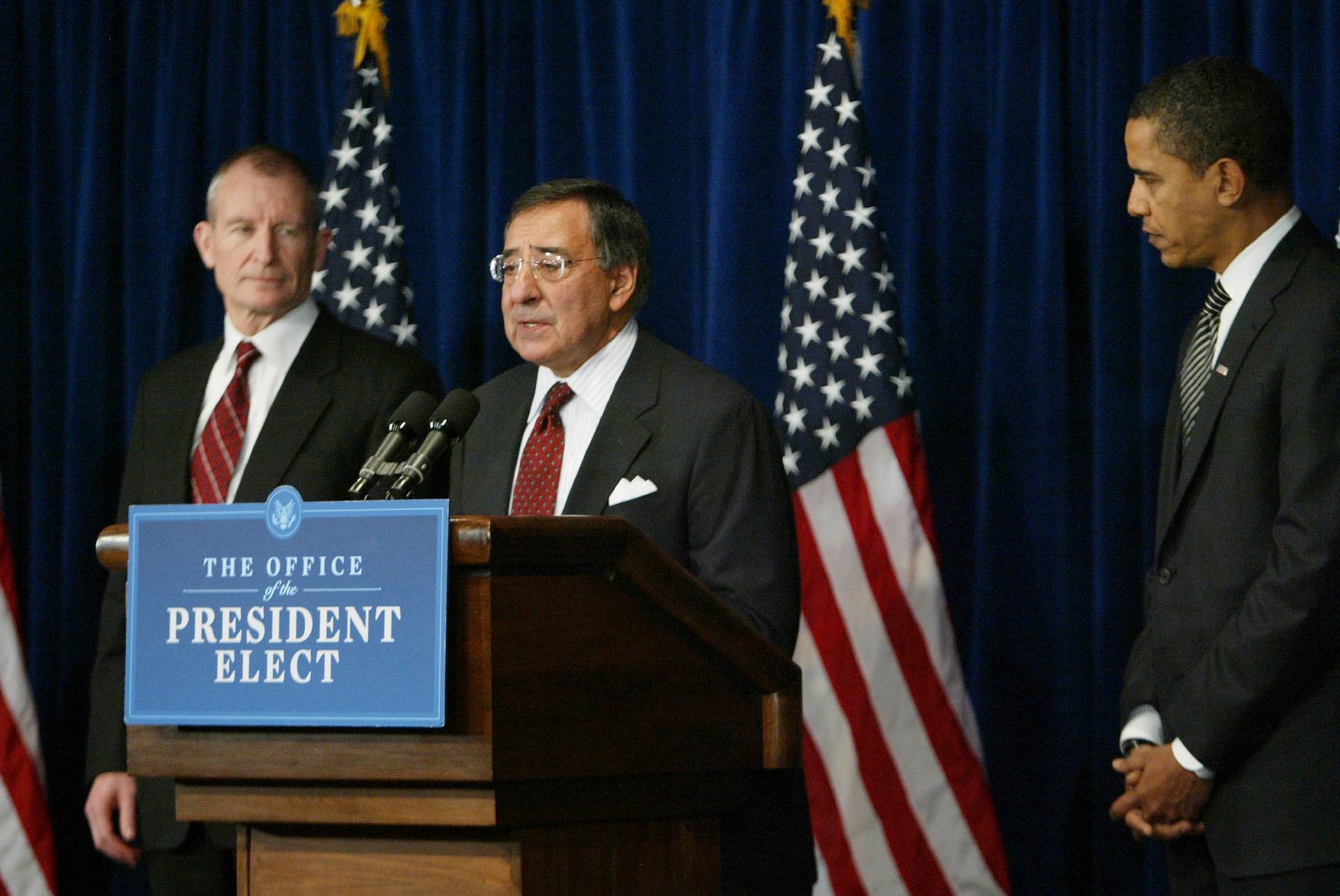A Guide to Panetta’s Confirmation Hearing
Panetta’s approach to the future of intelligence will have far-reaching implications for U.S. national security, the rule of law, and global human rights. Here’s a guide to what to watch for in his answers.
Jul 31, 2020297.4K Shares4M Views
Leon Panetta accepted then-President-elect Barack Obama's nomination to be CIA director on January 9. (WENN)
It’s been a rough month for Leon Panetta. First, in early January, President Obama’s choice to become the next director of the CIA met swift opposition from Sen. Dianne Feinstein (D-Calif.), the chairwoman of the Senate Select Committee on Intelligence, owing to Panetta’s lack of experience with the intelligence community. That endedin part because Panetta vowed to keep Steve Kappes, the well-regarded deputy director of the CIA, in his position — which in turn sparked a round of speculationas to whether Kappes, and not Panetta, would be the real power at Langley. Then the lateness of his nomination announcement — Obama was probably going to appoint ex-CIA senior official John Brennan to the job originally, and then had trouble finding a nominee after Brennan dropped out under fire from the left — delayed his confirmation hearing before Feinstein’s panel for a week because he couldn’t finish the necessary pre-hearing paperwork in time. If that wasn’t enough, last week his mother-in-law passed away.
Illustration by: Matt Mahurin
But Thursday afternoon is Panetta’s long-awaited confirmation hearing. As something of a cipher on intelligence matters, Panetta can expect a tough hearing. With the CIA intimately involved in the hunt for Al Qaeda; the wars in Afghanistan and Iraq; and the torture policies of the Bush administration, Panetta’s approach to the future of intelligence will have far-reaching implications for U.S. national security, the rule of law, and global human rights. Here’s a guide to what to watch for in his answers.
1. Loopholes in Obama’s torture ban. Practically as soon as Obama released his executive order barring torture and insisting upon a single, government-wide standard for interrogations— no more would one set of Geneva Conventions-compliant standards hold for military interrogators while CIA interrogators used a Geneva-exempt version — journalists busied themselves trying to find loopholes and exceptions. Panetta’s nomination came because of his organizational skills and his high-profile opposition to torture, but thorny questions remainabout how to flesh out provisions of the executive orders.
For instance, the orders demand the CIA shut down the so-called “Black Sites,” or secret prisons run by the agency or through its foreign-intelligence partners. But they do allow for CIA to hold detainees on “a short-term, transitory basis” before transferring them to another government agency. But how long should that period be? Hours? Days? Weeks? What procedures should be in place to determine humane treatment of those detainees during a time when they’re not likely to have access to human-rights monitors like the International Committee of the Red Cross? Can CIA interrogators get to work only after the detainees are transferred to other agencies’ custody, or can they interrogate detainees during the “short-term, transitory” period when they have chief custody of a detainee? Panetta, like Obama, has stressed that there shouldn’t be exceptions to bans on torture, but these operational questions are far from resolved.
**
- What Panetta says about renditions**. Republicans on the Senate panel have toldEli Lake of the Washington Times that they plan to question Panetta on whether he played any role in the Clinton administration’s expanded use of renditions — an extra-judicial process of kidnapping a terrorist suspect abroad and taking him into custody — when he was White house chief of staff. Richard Clarke, who served as counterterrorism czar in the administrations of George H.W. Bush, Bill Clinton and George W. Bush, told Lake that Panetta played no such role; and Clarke recently wrote an op-edfor The Boston Globe arguing that rendition is a valuable counterterrorism tool, so long as it doesn’t become a license to send terrorism suspects to third countries that practice torture, a practice known under the Bush administration (and to a lesser extent the Clinton administration) as “extraordinary rendition.” Indeed, John Brennan, who will serve in the Obama White House as an assistant to the president, has also defended the first, but not the second, kind of rendition.
It will be interesting to hear how Panetta clears up the dispute about his Clinton administration service. More interesting still will be whether Panetta defends renditions at all. Obama’s executive order leaves the door open to the first kind of renditions, empanelling a review of the practice led by cabinet officials to determine that renditions “do not result in the transfer of individuals to other nations to face torture or otherwise for the purpose, or with the effect, of undermining or circumventing the commitments or obligations of the United States to ensure the humane treatment of individuals in its custody or control.” What sort of human-rights guarantees will Panetta — who, if confirmed, will participate in the review — insist upon?
**
- Hunting al-Qaeda in Pakistan**. An increasing part of the hunt for Al Qaeda and Osama bin Laden has come to be military and CIA strikes in the tribal areas of western Pakistan where CIA analysts assessed in 2007 that the terrorist network has reconstituted a “safe haven.” President George W. Bush issued a secret order in 2008authorizing Special Forces ground raids into Pakistan, and that order is believed to have a component giving similar authorities for the CIA as well. Indeed, CIA and counterterrorism officials toldNPR’s Tom Gjelten this week that their raids over the last six-plus months have been so effective that they forsee what one described as a “complete al-Qaida defeat.” The obvious question: does Panetta want to keep or even expand these authorities, particularly as Pakistani officials — who used to look askance at the occasional CIA missile strike into the tribal areas — complain more vociferously about violations of their sovereignty?
4. How to work with the director of national intelligence. One of the thorniest bureaucratic relationships in Washington is the one between the director of national intelligence, the overall head of the intelligence community, and the CIA director, who leads its preeminent component. The lines marking each others’ boundaries are famously murky: the 2004 law stripping the CIA director of the leadership of the 16-agency constellation of intelligence organizations and creating the so-called DNI left a lot unresolved. Over the past year, however, the DNI has gone further into the operational field of intelligence than ever, requiring the chiefs of CIA stations in foreign countries to report to him directly, rather than to the CIA director. “This is like two competing institutions,” a knowledgeable former intelligence official told TWI in December. “The DNI’s not [supposed to] have these resources. If every time he makes a demand on CIA there’s resentment and pushback, it’s a huge problem.”
But how to fix it? Dennis Blair, the new director of national intelligence, didn’t specify during his own confirmation hearing. Under the Bush administration, the CIA director retained responsibilities as manager of the nation’s human-intelligence and clandestine services, which have the difficult work of, among other things, cultivating spies. Does Panetta believe that Congress needs to pass additional laws to clarify that status? Or is he less than perturbed by the DNI’s advances into clandestine activities?
**5. What to do about torture investigations? At**Dennis Blair’s confirmation hearings, the now-director of national intelligence said he would aidin Senate intelligence committee attempts to investigate the CIA’s dip into torture during the Bush years. But Blair, who served briefly as the CIA’s liaison to the military, isn’t in the same position as Panetta, whose contacts with the agency he hopes to lead have been meager. CIA officers have worried all throughout the Bush administration that they’d find themselves under investigation for implementing the White House’s torture agenda — and investigations can be a prelude to prosecution. To go along with committee-driven inquests risks alienating the CIA rank-and-file.
The investigation issue is likely to emerge as a key one in this afternoon’s hearing. Democrats want a reckoning for the Bush administration; Republicans denounce one as a backward-looking witchhunt. The controversy has rather specific, obscure pivot points: whether, for instance, to release years-old, tightly-held CIA inspector general reports about torture and renditionto the committee, for instance; or whether to release the legal advice about torture offered by former acting general counsel John Rizzo. Veterans of the CIA’s operations directorate — some of whom have already purchased legal liability insurance— can be expected to pay attention to every nuance in Panetta’s answers.

Rhyley Carney
Reviewer
Latest Articles
Popular Articles

